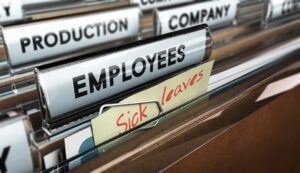
Taking sick leave, especially when at such short notice can often feel daunting, no matter how much you need it. It is important for employees to know what their rights are when it comes to sick leave, and also what employers can do for their staff when these situations arise.
According to data released by the Office for National Statistics (ONS), the average number of sickness absence days taken by UK workers has halved since 1993. It is suggested that this decrease is a result of many factors including:
- Improvement of healthy life expectancy
- Not receiving sick pay in the private sector (not always but often the case)
- Workers attending work when they’re ill due to “presenteeism” and fear of being replaced if they take time off.
Despite the evidence that suggests sickness is down, it is inevitable – we all need to take time off work from time to time due to sickness or emergencies. So the question is:
How much sick leave are you entitled to?
The best place to start when seeking your leave of absence entitlement is in your employment contract and employee handbook. The contract will often refer to any policies for sickness and absence that your employer has.
As an employer, it is always a good idea to implement a Sickness and Absence Policy to provide clarity to employees. Legal advice should always be saught when drafting such policies to ensure they comply with current law and other relevant policies or procedures.
Do you get paid for sickness days?
Sick pay from an employer is down to their discretion. Some employers offer this as a perk, some employers don’t pay sickness. This can come with its own policy and requirements from the employer and again, it is best to check your employment contract or employee handbook for such information.
Aside from the contract, it is worth remembering that employees (and some workers including agency workers) have rights under statute such as to Statutory Sick Pay (SSP). To be eligible for SSP you would need to be an “employee” as defined in the Social Security Contributions and Benefits Act 1992 (a thrilling read) and have done some work for your employer, to have been ill for at least 4 days in a row (including non-working days), earn at least the Lower Earnings Limit (LEL) and have informed your employer that you are sick before their deadline (or within 7 days). You will not qualify if you have already received the maximum (28 weeks) of SSP or you are in receipt of Statutory Maternity Pay.
How many days can I be off sick without a doctor’s note?
It is important to note that you do not have to provide your employer with a ‘Fit Note’ from your doctor until you have been off sick for more than seven days in a row (including non-working days) and until this time you can ‘self-certify’. Failure to report your absence or provide a Fit Note in accordance with your contract could lead to disciplinary action of some kind against you.
What is classed as emergency leave?
So what if you need to be off work for a reason other than sickness? Are all situations covered? You may not be aware that you are not actually entitled to time off for any emergency (unless your contract states otherwise or they offer compassionate leave). For example, your employer does not have to give you time off to deal with relationship problems, dealing with illness/injury to a pet, home emergencies (such as fire, burglary or broken boiler) or taking dependants to planned appointments.
However, as an employee, you are entitled to time off work to deal with an emergency involving a dependant. In accordance with section 57A of the Employment Rights Act 1996 “An employee is entitled to be permitted by his employer to take a reasonable amount of time off during the employee’s working hours in order to take action which is necessary”.
A dependant can be a child, spouse/partner, grandchild, parent (becoming more common) or someone who depends on you for care. This right cannot be used to take long periods off work to actually provide care yourself but rather time off to deal with the initial emergency and to make different arrangements. If you are struggling to organise alternatives you could always exercise your right to request flexible working and seek to agree something with your employer.
What will be considered ‘reasonable’ will depend on the situation but in general, one or two days would be deemed sufficient to deal with most immediate issues. There are no limits on how many times you can take time off work because of dependants so long as (on each occasion) it is unavoidable and all attempts have been otherwise exhausted. Employees do not, therefore, have free reign to take an extra day off as and when they feel and use dependants as an excuse!
Employers may consider disciplinary proceedings if they do not believe that an absence is genuine, however, a tactful approach is recommended in these circumstances (an informal conversation to discuss an employee’s absences is normally a better starting point).
Is emergency leave paid?
Such leave is likely to be unpaid unless your contract states otherwise. You must tell your employer as soon as possible of your required absence and it is good practice to try to give an indication of the length of time you expect to be absent.
Can an employer refuse to give you unpaid leave?
Although disruption to business can be very inconvenient, employers must not refuse reasonable time off, dismiss employees or select them for redundancy for requesting time off to deal with a dependant or treat them less favourably for taking time off. This could result in a formal complaint or even Employment Tribunal proceedings.
Cases concerning time off for dependants have gone to Tribunal before and this highlights the care that employers have to take when handling such requests. In one case, a claimant was awarded £1,000 in compensation when she was given a formal warning for absence (in total, seven days in 12 months to look after her ill son) where the absence was proven to be genuine and the warning held to amount to a detriment.
Employers may consider disciplinary proceedings if they do not believe that an absence is genuine, however, a tactful approach is recommended in these circumstances (an informal conversation to discuss an employee’s absences is normally a better starting point).
The employment team at Jacksons are always here to help if your business suffers with an epidemic of sickness and absence. If you encounter any problems or need further advice, please get in touch with us today.
Matthew Rowlinson, Employment Solicitor, Jacksons Law Firm
Tel: 0191 2322574
E: mrowlinson@jacksons-law.com






